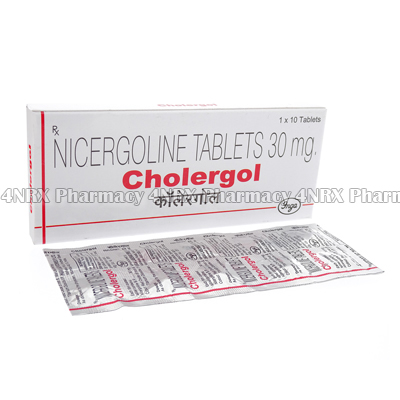 |
Home  Neurological Health Neurological Health  Cholergol (Nicergoline) Cholergol (Nicergoline) |
|
|||||||||
|
|
Cholergol (Nicergoline)
What is Cholergol (Nicergoline) used for? Cholergol (Nicergoline) is prescribed to treat patients suffering from senile dementia or other vascular conditions such as vascular migraines, cerebral thrombosis, or atherosclerosis. The medication is an ergot derivative that operates by increasing blood flow in the brain to improve mental acuteness and clarity. Your doctor may also prescribe it to treat other unlisted conditions. How should I use Cholergol (Nicergoline)? Follow your doctor`s instructions for using Cholergol (Nicergoline) to get the most effective results. It is normally taken once each day, but your particular dosage and frequency of administration will depend on your symptoms and current health condition. The doses should be swallowed with a large glass of water and may be taken with or without food. Never split, crush, or chew the tablets before use as this may destroy or alter the effects of the contents. If you have any questions about using the medicine, ask your doctor or pharmacist to ensure the correct application. What are the side effects of Cholergol (Nicergoline)? Some side effects may occur while using Cholergol (Nicergoline) such as:
Tell your doctor if any of these symptoms become intense or if more serious side effects occur including a slowed heart rate, severe diarrhea, increased appetite, or increased perspiration. These conditions may require emergency medical treatment or adjustments to your regimen to prevent further complications from occurring. Please Note Strictly use Cholergol (Nicergoline) as prescribed and follow all instructions provided by your doctor. Safe, suitable, and optimum dosage can vary and is dependent on the patient`s health and medical history, as well as the condition you are treating. Cholergol (Nicergoline) may not be safe or suitable for all patients. Always ensure your doctor is informed if you are pregnant or breastfeeding, using any other type of medication (including non-prescription medicine, vitamins, and supplements), as well as if you have any allergies, other illnesses, or pre-existing medication conditions. Seek immediate medical attention or proceed to your nearest accident and emergency department if you suffer a hypersensitive or allergic reaction. Symptoms usually present during a reaction of this nature include difficulty breathing or swallowing, swelling of the limbs or face, tight chest, hives, and skin rashes. 
|
||||||||||||||||||||||